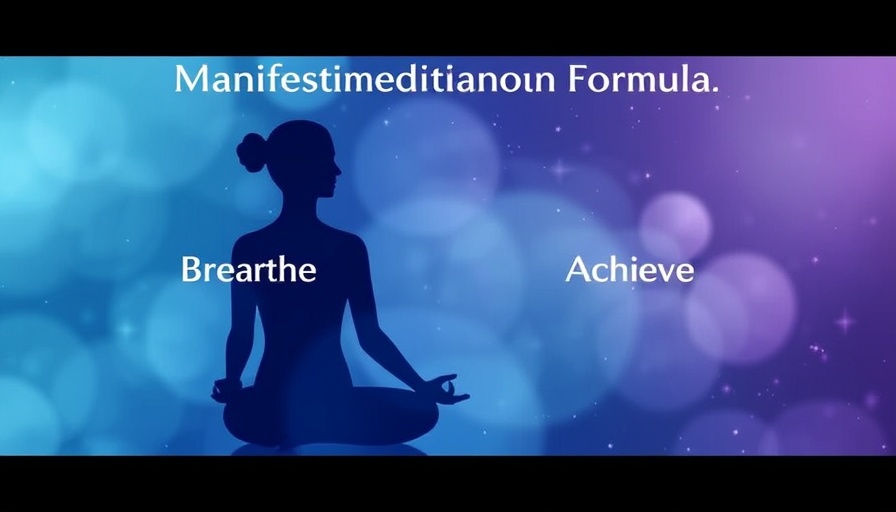
Unpacking the Power of Manifestation through Meditation
In today's fast-paced world, the idea of manifesting one's desires through meditation is becoming increasingly popular, especially among parents seeking balance and fulfillment in their family lives. The concept is simple yet profound: breathe, believe, and achieve. This three-step formula can help individuals, particularly parents, to align their intentions with their actions, ultimately paving the way for a more positive and enriching life.
A Journey from Stress to Serenity
For many parents, the daily hustle often leads to stress and overwhelm. Manifesting meditation offers a reprieve from this chaos. By focusing on breathing techniques and positive affirmations, individuals can cultivate a deeper sense of calm, enabling them to tackle daily challenges with a clear mind. This can be particularly beneficial in the context of addiction treatment and recovery, where stress management is crucial for maintaining sobriety.
The Science Behind Meditation and Addiction Recovery
Research indicates that mindfulness-based therapies, such as meditation, play a critical role in addiction rehabilitation. These practices not only help with emotional regulation but also reduce cravings and the likelihood of relapse. For parents, the integration of meditation into their lives can serve as a tool for enhancing awareness and responsiveness to their children's needs, especially in situations where substance use may be a factor.
Finding Balance: Meditation in Family Life
The benefits of meditation extend beyond personal wellness; it creates a ripple effect within the family unit. Parents practicing meditation can improve their emotional well-being, fostering a nurturing environment conducive to healthy child development. Moreover, involving children in mindfulness practices can instill valuable life skills, empowering them to navigate their own challenges with resilience.
Practical Steps to Start Your Manifesting Journey
To effectively begin your journey with manifesting meditation, consider incorporating these practical steps into your routine:
- Create a dedicated space: Designate a quiet area in your home for meditation. This can help signal to your mind that it's time to relax and focus.
- Establish a routine: Consistency is key. Set aside a specific time each day—whether in the morning or evening—to practice meditation.
- Use guided meditations: For beginners, guided meditations can offer direction and support, making it easier to focus and stay engaged.
- Set intentions: Before beginning your meditation, take a moment to visualize what you wish to manifest. This helps to align your thoughts and emotions with your desired outcomes.
- Reflect and journal: After meditating, take some time to jot down your feelings and insights. This practice can deepen your understanding of your journey.
Encouraging Family Participation in Meditation Practice
Encouraging your family to join your meditation journey can enhance bonds and create shared experiences that promote inner peace. Activities such as family yoga, guided group mediation sessions, or even art therapy can further foster a holistic approach to wellness, essential for staying grounded amidst life’s pressures.
Understanding Dual Diagnosis Treatment in Context of Family
Many parents grappling with substance abuse or mental health issues might benefit from dual diagnosis treatment. This type of therapy addresses both addiction and underlying psychological disorders simultaneously. Mindfulness-based therapies, including meditation, can significantly enhance dual diagnosis treatment by equipping individuals with coping skills and emotional regulation techniques necessary for recovery.
Future Trends: The Rise of Holistic Approaches in Rehab and Recovery
The emerging trend in addiction recovery is leaning towards holistic treatments—incorporating techniques like meditation, yoga, and nutritional guidance. As this trend continues to evolve, it presents an opportunity for families to explore integrative wellness practices that can lead to profound personal and communal transformations.
Tips for Seeking Help and Resources
If you or someone you know is struggling with addiction, it’s essential to seek help. Reach out to local rehab facilities that provide comprehensive care, including inpatient and outpatient options. Many facilities are now offering holistic services such as meditation, art therapy, and family counseling, making recovery a more supportive and integrated process.
In conclusion, exploring the intersection of manifesting meditation and addiction recovery can provide parents with unique tools to create balance and positivity in their lives. If you've found value in this exploration, consider integrating meditation into your daily routine and fostering these practices within your family. Discover the transformative power it can have on your household.
 Add Row
Add Row  Add
Add 




Write A Comment